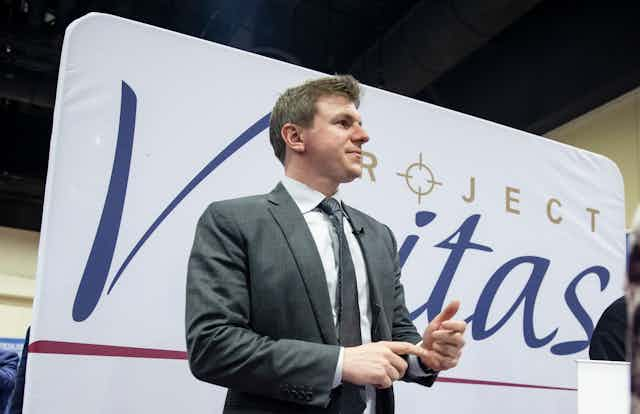James O'Keefe, the founder of Project Veritas, says he has been fired. He is no longer leading the conservative nonprofit organization, which is known for its use of hidden cameras and false identities to try to catch members of the media and progressive leaders saying embarrassing things and to expose their supposed liberal biases.
To learn more about the accusations against O'Keefe and what the legal consequences might be for the tax-exempt organization, The Conversation asked nonprofit law scholar Samuel Brunson five questions to explain the situation and the issues it raises.
Who is accused of what, exactly?
The board of directors of Project Veritas has accused O'Keefe of “financial misfeasance.” Its allegations of financial improprieties by the man who until recently served as the group’s chairman include that he spent money donated to the organization on various luxuries for himself, such as charter flights and theater tickets.
If the accusations prove valid, it is possible that this misuse of Project Veritas funds could imperil the group’s tax exemption. A tax-exempt organization cannot use its money to benefit certain individuals, especially insiders such as its leaders and major donors. It can pay its employees, but the staff and its leaders cannot receive unreasonable compensation or any other type of benefit that looks like the tax-exempt organization is sharing its profits with them.
While it sounds odd that a nonprofit would have profits, it is not. The rule for nonprofit and tax-exempt organizations is not that they cannot make profits; it is that, unlike for-profit entities, they cannot distribute their profits to shareholders.
2. Why would it be a big deal if Project Veritas were to lose its tax-exempt status?
Tax-exempt status provides at least three benefits to Project Veritas.
First, these groups don’t need to pay taxes on most of their revenue.
Second, and likely more importantly, it means that donations to Project Veritas are tax deductible for many wealthy supporters. Through what’s known as the charitable deduction, donors can essentially get a subsidy from the federal government for their donations.
The third benefit: Tax exemption can provide a veneer of legitimacy to an organization by signaling to some potential donors that the federal government has approved of its activities.
But, in fact, tax exemption does not represent any type of government approval. That’s because the government cannot deny tax-exempt status on the basis of ideological disagreement.
3. How has James O'Keefe responded?
O'Keefe acknowledged in a long video posted to the Vimeo video platform that he had been forced out. The board has declared that he has had the opportunity to meet with its members to discuss allegations of financial misdeeds and mistreating staff members. But the man who founded the group 13 years ago has declined to take that opportunity.
O'Keefe also indicated in the video, which he said was being recorded on Feb. 20, 2023, that he may intend to launch a new organization. “I’m not done,” he said. “The mission will perhaps take on a new name.”
4. In a situation like this, are the authorities likely to look into the accusations?
The Internal Revenue Service could investigate the allegations if it wanted to do so. Although the agency is underfunded and understaffed, it sometimes uses high-profile and highly publicized instances of noncompliance to discourage other people and groups from violating tax laws.
That said, based on the publicly available facts, I can’t yet tell whether Project Veritas has violated the rules governing tax-exempt status. While O'Keefe may have misused the group’s funds, it looks like he did it without the board’s knowledge or approval.
The Tax Court, a federal court that adjudicates tax disputes, has explained that a charity does not lose its exemption just because an officer of the charity has “skimmed or embezzled or otherwise stolen from the charity.” Unless there is some evidence that Project Veritas deliberately allowed O'Keefe to use its resources for personal consumption, I suspect the IRS will not pursue this.
5. How can such a demonstrably partisan group have nonprofit status?
Project Veritas claims exemption as an educational organization. According to U.S. Treasury Department regulations, an organization that advocates for a particular viewpoint can be educational for exemption purposes, even though it “advocates a particular position or viewpoint,” as long as it fully presents the facts in a way that allows listeners to make an informed conclusion.
Does Project Veritas meet what the IRS calls the “full and fair exposition” test? If so, and as long as it complies with the other requirements for tax-exempt status, it qualifies as exempt – notwithstanding its ideological leanings.

